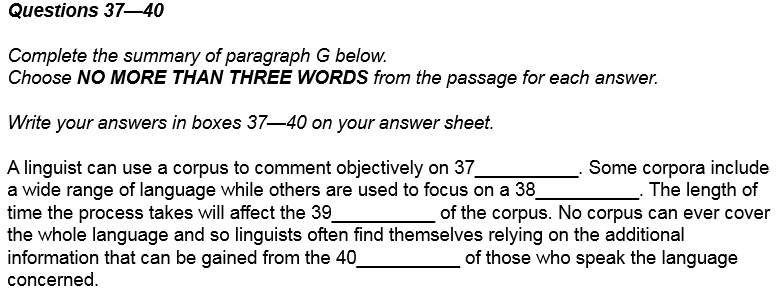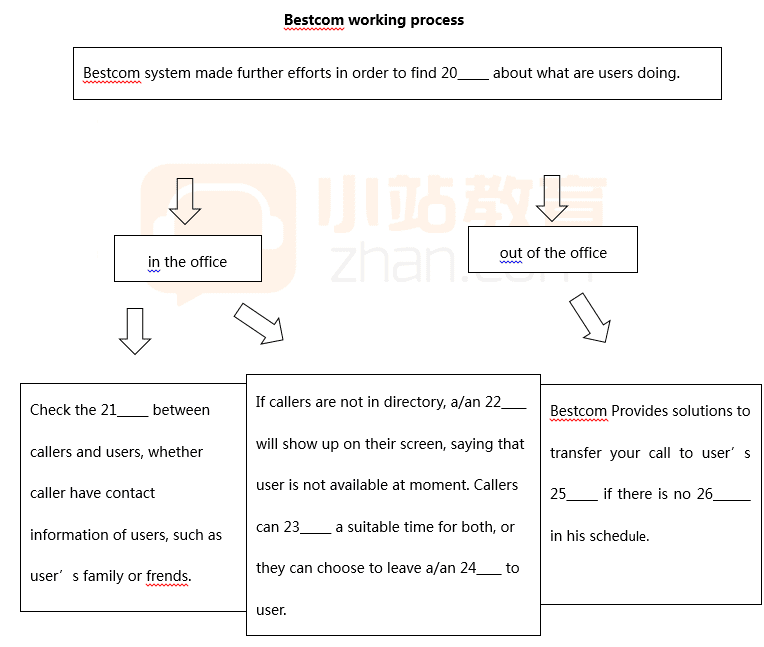雅思阅读高分必经之路 ,正确率与答题速度双提升。小编给大家带来了雅思阅读高分必经之路,希望能够帮助到大家,下面小编就和大家分享,来欣赏一下吧。
雅思阅读高分必经之路 正确率与答题速度双提升
如何保证雅思阅读做题正确率
01做好临场心理建设
任何考试都有临场发挥的因素,而纵观临场发挥好的同学,大都有一个特点,就是心理素质好,有一定的大局观。
因此,当你刚刚进入考场,在考位坐定之后,首先需要做的就是对自己进行心理辅导。你需要再次提醒自己,一定要沉着应战,不要慌,确保把有把握的分数拿到手。
02从熟悉话题入手
基于每个考生的专业背景知识不同,在拿到试卷后,建议大家首先快速浏览下每篇文章的题目,然后根据你自己的经验,选择一篇自己最容易把握的文章。
比如,剑桥 12 中 test 8 中的第三篇题目是:UK companies need more effective boards of directors,这个涉及到金融和企业管理方面的话题,很多同学都觉得比较难,但是也有同学正好学金融专业,认为相当简单,对于这类同学,就可以直接从第三篇入手。
因为三篇文章之间并没有关联性,也没有固定的难易顺序,所以用这种方式可以让我们从最容易的部分入手,先确保有把握的题目的正确率。
03快速浏览全文
选定一篇文章后,快速浏览全文,需要采取详读加略读的策略,尽量把时间控制在 20 分钟之内。
所谓详读,就是需要我们逐字阅读,透彻理解内涵意思的部分;略读,就是可以扫一眼就直接略过的部分。注意,略读这一部分,实际是节省了我们的阅读量,而非提升了我们的阅读速度。
那哪些内容需要详读,哪些内容可以略读呢?
详读:
结构主体(重要的话题、观点、逻辑结构需要记录下来);非举例性质的概括描述
略读:
大量的数据堆积;明显的举例(只需要了解在哪个位置有一个关于什么的举例即可);对比 / 类比只读一半(双方的比较,看了一半,就能推测出下半句意思的,则下半句直接略过);让步转折读一半(读转折后的一半,是主体部分)。
04雅思阅读过程中做笔记
很多同学不认同做笔记的方式,认为浪费时间。但是,如果你没有更好的方式去应对时间压力,不妨试试这种方法。
因为做笔记不但能够帮助我们记住更多原文信息,还能辅助我们理顺文章的逻辑脉络,而最重要的是在做题阶段帮助我们迅速定位原文。
虽然在做题过程中消耗了一定时间,但是到了做题阶段,依靠笔记可以快速定位原文,反而是缩短了做题时间,提高了整体答题效率的。
那么,笔记记什么?
核心名词(包括主题、重点概念、新出现的概念),时间、地点、人物、重要数字(这些点都容易成为考点),具体事例(简单记录,对于比较长的单词或词组注意使用缩写),逻辑关系(有助于理顺对文章的逻辑认知)
对于还在备考雅思阅读阶段的同学,建议最好提前养成做笔记的习惯,在日常训练中,形成一套自己熟悉的笔记体系。在记笔记的时候,分段记录,边读边记,注意运用适当的笔记符号和缩写。
05合理规划做题策略
雅思阅读的题目设置总共分为几大类:Heading, Matching,TFNG (YNNG),Multiple-Choice,Completion,Summary。
而就其本质来讲,就二类:判断题和填空题。
因为 Heading 题本质上就是去判断小标题和原文哪段信息相符合;Matching 是判断每道题和原文哪部分信息相一致,TFNG (YNNG)也是判断某个信息与原文是否相符合;Multiple-Choice 是判断每一个选项是否在原文有依据。而 Completion,Summary 则都是填空题。
既然雅思阅读判断题和填空题都是去原文找依据,所以做题顺序其实对效率影响并不大。而如果你是按照科学的方法,提前完成了读文章和做笔记这两步,在这里也不必去在意做题顺序。
直接依靠笔记,快速定位原文即可(有些题,比如主旨大意题,甚至不需要定位原文,直接可由笔记得出答案。)
因此,具体的做题策略和方法是:审题(仔细阅读题干要求),定位(根据题干和选项关键词用笔记定位原文),理解(包括理解相关原文和选项,对比得出答案)。
当然,如果你在考场上,又不考虑做笔记,也可以推荐一个小技巧,就是先做细节信息题(包括细节匹配题、TFNG 题,填空题),最后做主旨大意题(Heading 题),因为当你对整篇文章内容比较了解的时候标题配对题会更加容易。
06严格进行时间把控
时间把控包括两部分:第一,每篇文章时间要控制到 20 分钟以内;第二,公平对待每道题目,不要厚此薄彼。
每篇文章的完成时间需控制在 20 分钟左右,这意味着读文章时间应控制在 6 - 8 分钟,做题时间控制在 12 - 14 分钟,这样能够保证每道题都至少分配到了 1 分钟。
想要实现这样一种雅思阅读速度,需要按照上文提到的详略阅读法进行快速浏览。另外,不要在一道题目上纠结太久,如果想不清楚,先放过,最后有时间再来思考。
以上就是在考场上想要提高时间利用率大家可以用到的一些方法和技巧。事实上,技巧永远都是锦上添花的东西,想要真正获取高分,离不开扎实的语言基本功。
如何从根本上提高雅思阅读速度
提高雅思阅读速度方法01积累词汇量
词汇量的重要性无需赘言,所谓一力降十会。所以建议大家在备考阶段,词汇量一定要予以十二分的重视。
选取一本合适的词汇书(收纳了雅思高频词汇,并且释义准确),然后短期内高频重复背诵。
(妞酱温馨提示:在后台回复【词汇】,即可获得3500雅思高频词汇书)
提高雅思阅读速度方法02进行句子分析训练
句子读的慢,根本原因是理解得慢,句子读不懂。
因此,备考阶段的一大任务应该是学会如何分析句子,并通过大量句子分析训练,使自己能够快速提取句子主干成分,分辨出各部分的语法功能,从而让自己快速理解句子意思。
做句子分析之前,先通读一遍原文,并把生词意思查好标出。然后针对复合句进行句子分析,具体步骤如下:
第一步,子句拆分(将复合句拆分为多个简单句,并分析复合结构与从句类型);
第二步,对各简单句进行成分划分(标出主语、谓语、宾语、系动词、表语、定语、状语、补语等成分);
第三步,翻译各简单句(将各个子句翻译为汉语);
第四步,整句翻译(将复合句作为一个整体进行翻译)。
如果你是朗播的学员,可以直接在【智能学习系统】里做“长难句分析”,一定要坚持做下去,当我们的句子分析能力没问题时,读文章的速度自然能够获得飞速提升了。
提高雅思阅读速度方法03学会做笔记
正如上文所述,笔记的这段时间消耗非常有价值,因此不仅不会浪费时间,还会帮大家增速不少。
强烈建议大家从备考时就养成做笔记的习惯,因为笔记中涉及符号和缩写,也涉及逻辑框架的构建,如果没有提前形成自己的体系,到了考场才临时发挥,容易出现手忙脚乱的情况。
最后,建议各位考生一定要先把基础打好,踏踏实实地把每套真题做透,参考以上的做题策略和学习方法,再在平时的练习中培养良好的做题习惯,在考试中实现更好的发挥。
雅思阅读素材积累:Hustling spires
雅思阅读:Hustling spires
A psychological leap is needed—both in British academia and in
Westminster
EMO OF FRIESLAND was Oxford's first recorded foreign student, and since
1190 they have kept pouring in. Both sides have benefited: Britain's
universities, economy and culture have been enriched, and foreign scholars have
been privileged to mix with the best. In recent years foreigners' higher fees
have helped to keep increasingly hard-pressed institutions solvent.
Now, as rich-world students become more adventurous, and prosperous
emerging countries churn out would-be undergraduates faster than good university
places, the market in international higher education is booming. The number of
students enrolled outside their home country has roughly trebled since 1980, on
OECD figures. Britain is a world leader in this market, second only to
America.
But the business is changing. In addition to the traditional Anglophone
competitors for foreign students, many continental European places now teach in
English. Countries that once consumed international education now provide it:
Singapore is well on its way to becoming a regional hub. Universities (including
British ones) are setting up campuses across borders. In short, students have
more choice than ever; they are less likely to tolerate being fee fodder to
subsidise Britons' education just because a brochure boasts an ancient-looking
crest.
To flourish, British universities and their political masters must make a
host of small changes and one huge one. The former mostly involve marketing.
There is remarkably little differentiation now: Oxbridge colleges and former
polytechnics all seem to have the same blurbs, which can lead foreign students
to think they have been sold a pup. Too many universities think their job is
done after the last exam: in fact forging strong alumni networks overseas is
good for recruitment, good for ex-students and good for their alma maters' bank
balances.
A geographic bias must be corrected too. China has been the big story, its
students flooding Western campuses. Britain targeted that market well. But as
that one-child country ages, India is the place to go for. Britain is belatedly
trying to fix a change to the visa regime that angered many Indian students in
particular by appearing to lump them in with subcontinental terrorists. There is
talk of British universities teaming up with Indian ones. But more could be
done.
The huge change is psychological: stop thinking of foreign students as mugs
to be overcharged to subsidise poor Britons. That has never worked in any
business and it is not going to work in this one. Rather concentrate on making
British universities as good as possible. That above all means allowing them to
charge domestic students something close to the real cost of their
education.
This is fair:the average value of an education to the recipient exceeds the
direst estimates of the fees involved. It also creates a virtuous circle.
Better-funded universities can hire more good professors and build more modern
laboratories. Britons will get a better education, and it will attract more
foreign students too—who can help pay for more.
The man with the chequebook is your student
With their famous names and skilled workers, Britain's universities are in
the same state as its motorbike-makers and banks were half a century ago. One
clung to state handouts and the idea that people had no choice: it disappeared.
The other decided to sell to the world and deregulated. For all the City of
London's recent travails, it is surely a better model for Oxford, Cambridge et
al than the likes of the BSA Triumph.
雅思阅读考试短句子整理
1. allow for (=take into consideration, take into account) 考虑到, 估计到
2.amount to (=to be equal to) 总计, 等于
3. answer for (undertake responsibility for, be liable for, take charge
for) 对…负责
4. answer to (=conform to) 适合,符合
5. be anxious about 为…焦急不安; 或anxious for
6. apologize to sb. for sth. 为…向…道歉
7. appeal to sb. for sth. 为某事向某人呼吁。 appeal to sb. 对某人有吸引力
8. apply to sb. for sth. 为…向…申请 ; apply for申请; apply to 适用
9. apply to 与…有关;适用
10. approve of (=consent to, be in favor of, favor, agree to, consider
good, right) 赞成, approve vt. 批准
11. arise from(=be caused by) 由…引起
12. arrange for sb./sth. to do sth. 安排…做…
13. arrive on 到达; arrive at 到达某地(小地方);得出,作出; arrive in 到达某地(大地方)
14. be ashamed of (=feel shame, guilt or sorrow because of sth. done)
以…为羞耻
15. assure sb. of sth. (=try to cause to believe or trust in sth.) 向…保证,
使…确信
16. attach(to) (=to fix, fasten; join) 缚, 系 ,结
17. make an attempt at doing sth. (to do sth.) 试图做…
18. attend to (=give one‘s attention, care and thought)注意,照顾;attend
on(upon)(=wait upon, serve, look after) 侍候,照料
19. attitude to/ toward …对…的态度,看法
20. attribute…to…(=to believe sth. to be the result of…)把……归因于……,
认为……是……的结果
雅思阅读高分必经之路
下一篇:返回列表






